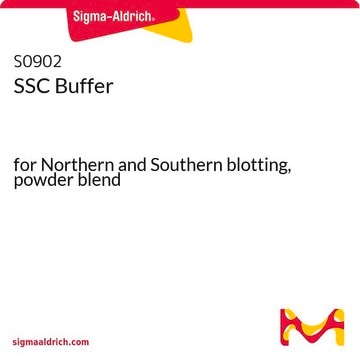S8015
SSC Buffer
for Northern and Southern blotting, powder blend
Sign Into View Organizational & Contract Pricing
All Photos(1)
About This Item
UNSPSC Code:
41105319
NACRES:
NA.25
Recommended Products
grade
for molecular biology
form
powder blend
pH
6.9-7.1 (20-25 °C, 20 ×)
foreign activity
DNAse, none detected
Endonuclease, none detected
Exonuclease, none detected
NICKase, none detected
RNAse, none detected
storage temp.
room temp
General description
SSC (Saline Sodium Citrate) Buffer 20x powder is a standard reagent in Southern and Northern hybridization procedures. It is used to control stringency of wash buffer for the washing steps after hybridization. SSC buffer powder should be reconstituted to the final indicated volume using molecular biology grade water.
Application
Suitable for use in washing buffer for Northern and Southern hybridization procedures.
Features and Benefits
- Easy to reconstitute powder
- Multi-purpose use in hybridizations
Components
SSC Buffer 20x contains 3M NaCl in 0.3M sodium citrate (pH 7.0).
related product
Product No.
Description
Pricing
Storage Class Code
13 - Non Combustible Solids
WGK
WGK 1
Flash Point(F)
Not applicable
Flash Point(C)
Not applicable
Choose from one of the most recent versions:
Certificates of Analysis (COA)
Lot/Batch Number
Don't see the Right Version?
If you require a particular version, you can look up a specific certificate by the Lot or Batch number.
Already Own This Product?
Find documentation for the products that you have recently purchased in the Document Library.
Customers Also Viewed
A J Bogers et al.
European journal of cardio-thoracic surgery : official journal of the European Association for Cardio-thoracic Surgery, 2(3), 160-166 (1988-01-01)
To identify risk factors for hospital mortality after postinfarction left ventricular aneurysmectomy (PILVA), 83 consecutive cases of PILVA were studied in a retrospective analysis. Hospital mortality was 14.4%. Most of the factors correlated with hospital mortality were associated with poor
Aline V Probst et al.
Developmental cell, 19(4), 625-638 (2010-10-19)
At the time of fertilization, the paternal genome lacks the typical configuration and marks characteristic of pericentric heterochromatin. It is thus essential to understand the dynamics of this region during early development, its importance during that time period and how
Christèle Maison et al.
Nature genetics, 43(3), 220-227 (2011-02-15)
HP1 enrichment at pericentric heterochromatin is considered important for centromere function. Although HP1 binding to H3K9me3 can explain its accumulation at pericentric heterochromatin, how it is initially targeted there remains unclear. Here, in mouse cells, we reveal the presence of
Our team of scientists has experience in all areas of research including Life Science, Material Science, Chemical Synthesis, Chromatography, Analytical and many others.
Contact Technical Service












